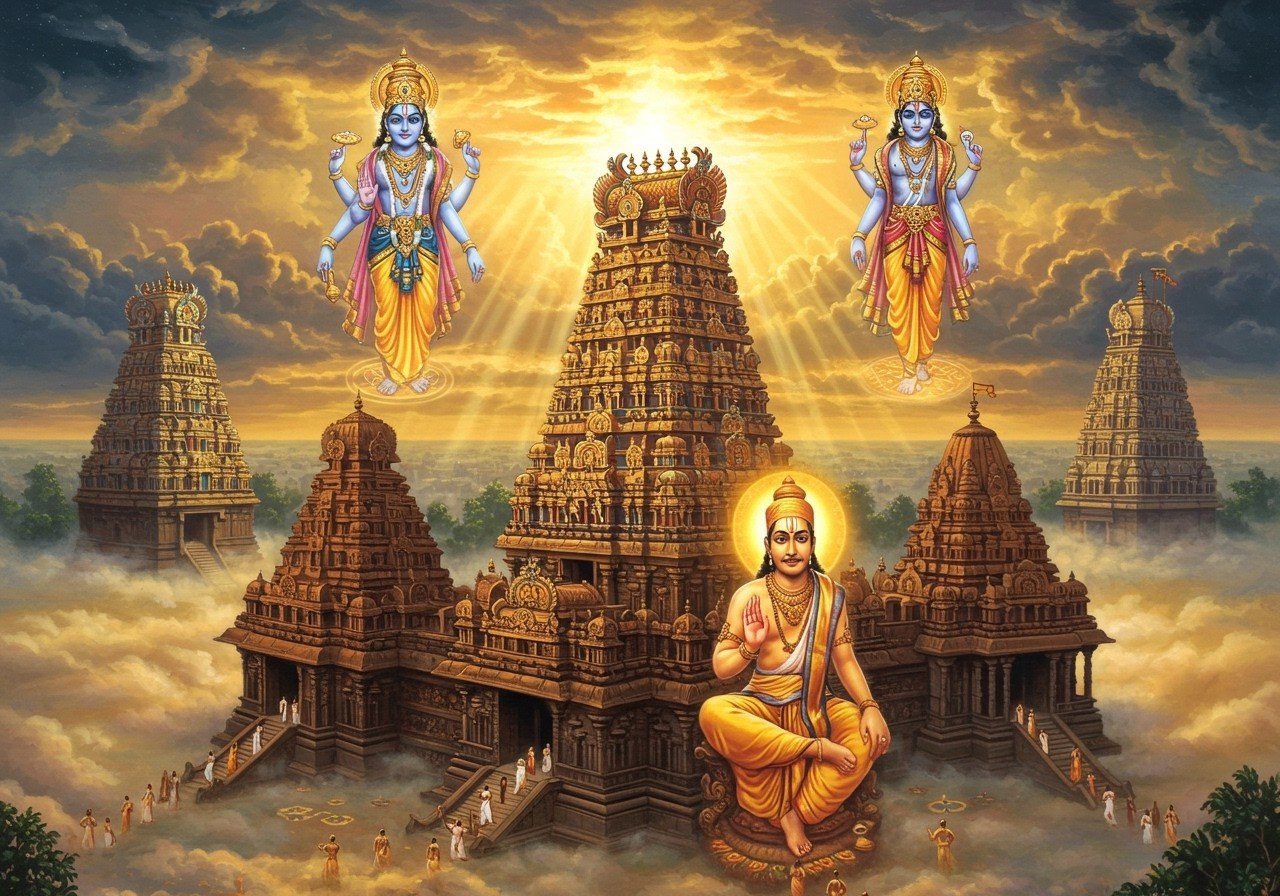
The world of Sri Ramanuja, a revered philosopher and theologian, holds deep significance in Hinduism. His teachings emphasize devotion to Vishnu and the unity of all beings in the divine, known as Vishishtadvaita or qualified non-dualism. Temples associated with Ramanuja are sacred pilgrimage sites, inspiring cultural and spiritual practices among Indians.
Ramanuja Temple Hyderabad
Discover the Rich Legacy of Ramanuja in Hyderabad
The Ramanuja Temple in Hyderabad, also known as the Statue of Equality, is a modern structure dedicated to the saint. It beautifully blends traditional Dravidian architectural elements with a contemporary design, making it architecturally unique. The temple serves as a center for learning and promotes Ramanuja’s teachings through various cultural and educational programs. The unique rituals and festivals celebrated here attract devotees from all over the country, offering a rich spiritual and cultural experience.
Explore Ramanuja’s Sacred Pilgrimage
Embarking on a pilgrimage centered around Ramanuja offers a profound spiritual journey. His teachings have deeply shaped the cultural and spiritual fabric of South India. These temples are more than just religious sites; they are gateways to understanding his enduring legacy.
Sriperumbudur: The Birthplace of Ramanuja
Sriperumbudur, Tamil Nadu, is where Ramanuja’s journey began. The Adi Kesava Temple holds immense significance as his birthplace. Within its sacred walls, you’ll find the “Thaan Ugantha Thirumeni,” an idol of Ramanuja himself, evoking a sense of his divine presence. The temple’s serene ambiance offers a poignant glimpse into his early life and spiritual awakening.
Kanchipuram: A Hub of Learning
Ramanuja’s intellectual journey flourished in Kanchipuram. At the Sri Varadaraja Perumal Temple, he studied under his guru, Yadava Prakasha. This temple stands as a testament to his scholarly pursuits and the formative years of his philosophical development. Tirupputkuzhi, located near Kanchipuram, is also associated with Ramanuja and Yadavaprakasar, providing further insights into his formative years.
Srirangam: A Spiritual Sanctuary
The Sri Ranganathaswamy Temple in Srirangam transcends being a mere pilgrimage site; it’s where Ramanuja dedicated a significant portion of his life, reforming its practices and shaping its spiritual landscape. He composed many of his important works within these sacred grounds, leaving an enduring mark on the temple’s rituals. The temple’s grandeur reflects Ramanuja’s unwavering devotion and transformative vision.
Thirukoshtiyur: The Preaching Grounds
Thirukoshtiyur holds a unique place in Ramanuja’s story. This is where he shared the Narayana mantram with the local community, underscoring his belief in the accessibility of divine wisdom for all. A visit to this temple allows devotees to connect with the inclusive nature of Ramanuja’s teachings and his commitment to spreading spiritual knowledge. The temple’s serene atmosphere encourages reflection on the power of simple devotion.
Thirunarayanapuram (Melkote): Reform and Worship
In Karnataka, Thirunarayanapuram, also known as Melkote, stands as a testament to Ramanuja’s reformative spirit. Here, he established the worship of Lord Cheluva Narayana, breathing new spiritual vibrancy into the region. This temple beautifully embodies his dedication to preserving tradition while embracing progress, reflecting his dynamic approach to religious practice. The temple’s architecture and rituals reflect Ramanuja’s lasting influence.
Tirupati: Structured Devotion
Ramanujacharya’s influence extended to Tirupati in Andhra Pradesh, where he established formal worship protocols that continue to shape the temple’s practices to this day. This site highlights his commitment to structured devotion and the vital role of rituals in connecting with the divine. The temple’s elaborate rituals and the devotion of its pilgrims are a testament to Ramanuja’s lasting impact.
Ahobilam: Seeking Divine Blessings
Ahobilam, a sacred site in Andhra Pradesh associated with Lord Narasimha, is where Ramanuja sought divine blessings. This visit symbolizes his unwavering faith and his profound quest for spiritual guidance and protection. The temple’s powerful energy and association with divine power make it a significant destination for those seeking spiritual strength.
Cultural and Spiritual Legacy
These temples collectively embody Ramanuja’s core teachings on devotion, equality, and the underlying unity of all beings. His emphasis on bhakti (devotion) and selfless service resonates deeply within these sacred sites, offering devotees a powerful opportunity for spiritual growth and cultural enrichment. They offer a unique window into the heart of South Indian spirituality.
By exploring these temples, one not only pays homage to Ramanuja’s legacy but also gains valuable insights into the harmonious blend of tradition and spirituality that he so passionately championed.
How Poojn.in Helps You Connect with Ramanuja’s Sacred Legacy
Poojn.in, India’s largest cultural goods and services store, offers a wide selection of essential items for worship at temples associated with Ramanuja. We provide authentic puja items that adhere to traditional specifications:
- Pure cotton vastrams (clothing): Perfect for temple visits, ensuring respectful attire in accordance with tradition. Our vastrams are sourced from high-quality materials and crafted with care.
- Traditional brass and copper lamps for aarti ceremonies: Enhance your worship experience with beautifully crafted lamps, adding a touch of traditional elegance to your rituals. These lamps are designed for optimal performance and aesthetic appeal.
- Pure ghee from Indian cows for deepam: Use pure and authentic ghee for your deepam, ensuring the sanctity of your rituals. Our ghee is sourced from trusted suppliers and meets the highest standards of purity.
- Authentic kumkum and chandanam for tilak: Obtain high-quality kumkum and chandanam for tilak, essential for traditional ceremonies and rituals. Our products are sourced from reputable vendors to guarantee authenticity and quality.
- Tulsi mala and rudraksha malas for prayers: Enhance your prayers with genuine Tulsi and Rudraksha malas, aiding in focus and devotion. We offer a variety of malas to suit individual preferences and spiritual practices.
- Pure silver and brass vessels for abhishekam: Perform abhishekam with pure silver and brass vessels, adding an element of sacredness to the ritual. Our vessels are meticulously crafted and designed for durability and ceremonial use.
Our products are sourced directly from verified vendors located near major Ramanuja temples, guaranteeing authenticity and supporting local artisans. Each item comes with detailed instructions on proper usage during temple rituals.
For devotees unable to physically visit these temples, we offer prasadam from select Ramanuja temples through special arrangements with temple authorities. All items are carefully packaged and shipped nationwide with tracking for your convenience.
Visit www.poojn.in or contact our support team for guidance on selecting the right puja items for your temple visits. We ensure that all our products meet traditional requirements while offering the ease of home delivery.
Shop Temple Puja Items at Poojn.in
Embracing Ramanuja’s Legacy
This sacred journey through the temples connected to Ramanuja is more than a pilgrimage; it’s a pathway to spiritual enlightenment and cultural understanding. Each temple serves as a powerful reminder of his profound influence on devotion, equality, and the interconnectedness of all beings. As you explore these revered sites, you connect with Ramanuja’s teachings and embrace a legacy that continues to inspire generations.
Visiting these sacred places not only enriches the soul but also strengthens the bond with our cherished traditions. It’s an invitation to reflect on the harmonious integration of devotion and spirituality that Ramanuja so eloquently championed. Through this pilgrimage, you gain invaluable insights into his life and teachings, fostering a deeper connection with your cultural roots and spiritual beliefs. Every step taken on this journey is a step towards honoring a legacy that remains vibrantly alive in the heart of every devotee.
FAQs on Key Temples Associated with Ramanuja
What distinguishes the Ramanuja Temple in Hyderabad? The Ramanuja Temple in Hyderabad, also known as the Statue of Equality, stands as a grand tribute to the philosopher. It boasts a magnificent statue of Ramanuja and is surrounded by smaller temples that represent his core teachings, creating a comprehensive spiritual and educational center. The complex offers a multifaceted experience for devotees and visitors alike.
Where is the Ramanuja Temple situated in Sriperumbudur? The Ramanuja Temple in Sriperumbudur is located in Tamil Nadu, the birthplace of Ramanuja. It’s formally known as the Sri Ramanuja Swamy Temple and is central to commemorating the philosopher’s life and legacy. The temple is a significant pilgrimage destination for followers of Ramanuja’s teachings.
Why is the Ramanuja Temple in Srirangam considered important? The Ramanuja Temple in Srirangam holds significance because it’s where Ramanuja spent a considerable part of his life. Located within the vast Ranganathaswamy Temple complex, one of India’s largest, it represents a crucial period in his spiritual and scholarly journey. The temple’s association with Ramanuja adds another layer of spiritual significance to this already important site.
Can visitors gain insights into Ramanuja’s philosophy at these temples? Yes, visitors can delve into Ramanuja’s philosophy and teachings at these temples. Many offer guided tours, enriching the experience with historical context and deeper understanding. Inscriptions and displays further explain his profound contributions to Hindu philosophy. These resources offer a valuable opportunity to learn about Ramanuja’s intellectual legacy.
Are there special events or festivals at these Ramanuja temples? Yes, these temples host special events and festivals, including Ramanuja Jayanti, celebrating his life and teachings. These events feature rituals, lectures, and cultural programs, immersing participants in the rich traditions associated with Ramanuja. They provide a vibrant and engaging way to connect with his spiritual legacy.
Is there an entry fee to visit the Ramanuja temples? Entry fees vary depending on the specific temple. Some may have a nominal fee, especially those with museums or additional attractions. Checking with the individual temple beforehand is recommended to avoid any surprises. This ensures a smooth and informed visit to these sacred sites.
What are the typical visiting hours for Ramanuja temples? Most temples welcome visitors from early morning until late evening, although the precise hours can differ. It’s best to confirm the specific temple’s schedule before planning your trip. This allows for efficient planning and maximizes your time at each location.
Are accommodation facilities available near these Ramanuja temples? Yes, various accommodations are available near most Ramanuja temples, ranging from budget-friendly options to luxurious hotels. Booking in advance, particularly during festival times, is highly recommended to secure your preferred choice. This ensures a comfortable and convenient stay during your pilgrimage.


